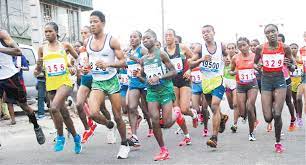By Edward T. Dibiana
( 08033275377, ednetcon@gmail.com)
As I sat in my car parked under the tree, in front of Utako market, Abuja, waiting for my wife, who had dashed into the busy market to pick up some items, I took in the environment. The sun was particularly vicious that afternoon, but hawkers and petty traders, mostly women and teenagers, appeared undaunted, marketing their wares under the unfriendly weather.
“So you still come today?”_ , someone asked a young lady, seated on the ground, under the tree, with bottles of groundnut on display. She was breastfeeding a baby of some months old. ” _Wetin I go do, my sister? Maybe I fit sell small market today. Na from hospital I come straight, we go do immunization_ ,” she replied in a tone suggestive of tiredness or exhaustion.
I looked at the baby sucking peacefully, oblivious of the harsh environment and the worries of her struggling mother. Touched by her short story that said a lot about her circumstance, I beckoned on her and bought a bottle of groundnut. He face beamed with a smile. “Brother thank you”, she said. At that instance, another woman rushed to me with a tray load of banana. I waved her away because I actually didn’t want to buy banana.
She walked away, sullen. I kept my gaze on her as she approached other potential buyers with no luck. She shuffled around the car lot, gesticulating and speaking to no one in particular. Moments later, she returned to me, this time very persuasive. ” _Oga, abeg, buy from me, abeg, see na big sweet banana. You fit buy for your children, if you no dey like banana. Them go enjoy am!”,_ she quipped.
I looked at her as she made her pitch, with the tray of banana balanced delicately on her head. Her lips were dry and her face appeared to be prematurely wrinkled. Though she was trying to smile, it was a sad smile, as her eyeballs betrayed her despair. She was middle aged and lanky, most likely, not by choice. Circumstance and fate appeared to have taken a toll on what would have been a natural beauty. But her persuasion prevailed, as I bought a bunch of banana for N1,000. Her face lit up in obvious expression of joy. She shuffled her feet around in mock dance steps. Her perseverance and persistence worked the ‘miracle’.
As she collected the naira note from me, she touched it on her forehead, and with a smile exclaimed, “Since yesterday!”, apparently alluding to the fact that she hadn’t made any sales since the previous day. But in spite of the poor sales and her meagre income, she wouldn’t escape meeting some human basic needs such as feeding . And most likely provide for other members of her family. Offset her rent. Pay school fees. Pay for electricity. Pay for transport and other sundry bills. God forbid if she falls sick.
Many people in our communities are facing similar grueling conditions. Those two encounters got me thinking. How does the ordinary man on the street (petty trader, artisan, poorly paid employee or the unemployed), cope with the current economic hardship? The cost of food and other basic household items are increasingly soaring. Food is one of the basic necessities of life, no matter one’s status in the society. But, really, how many people can afford to feed well in today’s Nigeria? The truth remains that there in hunger in the land. And the hunger is evolving into anger, especially as food is gradually becoming a luxury. Even common onion has become gold in Nigeria!
According to the Consumer Price Index (CPI) report, released by the National Bureau of Statistics (NBS), Nigeria’s food inflation rate rose to 13.22% in August 2020, highest recorded figure in 29 months, since March 2018 (13.24%).
Beyond NBS statistics, findings in local markets around Abuja indicate that prices of common food items that the common man ordinarily took for granted in the past are no longer friendly. For instance, a crate of egg has risen from N900 to N1,300, a carton of frozen chicken is now N13,000 from N10,000 it sold in January. The trend replicates in other food items.
It is a matter of argument if the political class and other privileged individuals in the society feel the adverse effects of these changes in prices of foodstuffs, given that some of them are feeding fat on the system that is skewed in a way that opportunities are not equitably distributed.
This club of the privileged is an arrangement which admits just a few in the society and for the rest, life is a battle. In such a situation, majority gets united by poverty, deprivation, despair, hunger and, lately, anger as their purchasing power continues to dwindle.
At no time did the brutal reality get a vivid expression as the recent #EndSARS protests across the nation, especially the subsequent rage that saw the wanton destruction of public and private properties and the pathetic looting of food palliatives from warehouses at different locations.
But perhaps more telling, is the depressing data from the World Poverty Clock, which indicates that more than 105 million Nigerians are now living in extreme poverty. The data suggests that the figure has drastically increased, as a result of the impact of COVID-19 pandemic on living conditions of the Nigerian populace.
It went further to state that, “Nigeria has a total population of 205,323,520 people; and of that number, 105,097,856, representing 51 per cent of the country, now live below $1.90 (N855) per day.”
These figures unfortunately are not mere numbers. They represent the people we see every day on our streets. This 51 per cent live among us. They are in our churches and mosques. They live on our streets, neighborhoods and communities. Those described as living in extreme poverty in Nigeria are in fact our compatriots. They are our friends, family members, colleagues and associates. They are not just mere statistics.
This gloomy outlook is hardly surprising in a country where the rate of unemployment is on a steady rise. According to recently released NBC report, Nigeria recorded 35% of youth unemployment as at June, 2020. The unemployment rate was 13.96% in 2019, 12.48% in 2017 and 7.81% in 2015, respectively.
The narrative on the streets is that the President Muhammadu Buhari administration is not doing much to bring about a meaningful change in the life of the people. Some even say that the President is not doing anything at all. But to be fair to him, he has taken some steps and made a few promises, one of which is that his government is working hard to pull 100 million Nigerians out of poverty in the next 10 years!
Just last month in his nationwide broadcast over the the #EndSARS protests, President Buhari outlined some of such plans to include the controversial “Farmermoni, Tradamoni, Marketmoni, N-Power, N-Tech and N-Agro”. While many dismiss these programmes as merely politically motivated quick-fixes, referred to as “money for the boys” charade, the President continues to praise his administration by claiming that no previous government in Nigeria has done as well for the wellbeing and welfare of the citizenry.
Amazingly, in what some critics likened as self-deceit, some key players in Buhari’s government have continued to echo this bewildering self-adulation. But sadly, the voices and images on our streets, do not support such claims. If anything, the pictures out there, indicate dangers ahead.
Dibiana, a Development Journalist, wrote from Abuja















